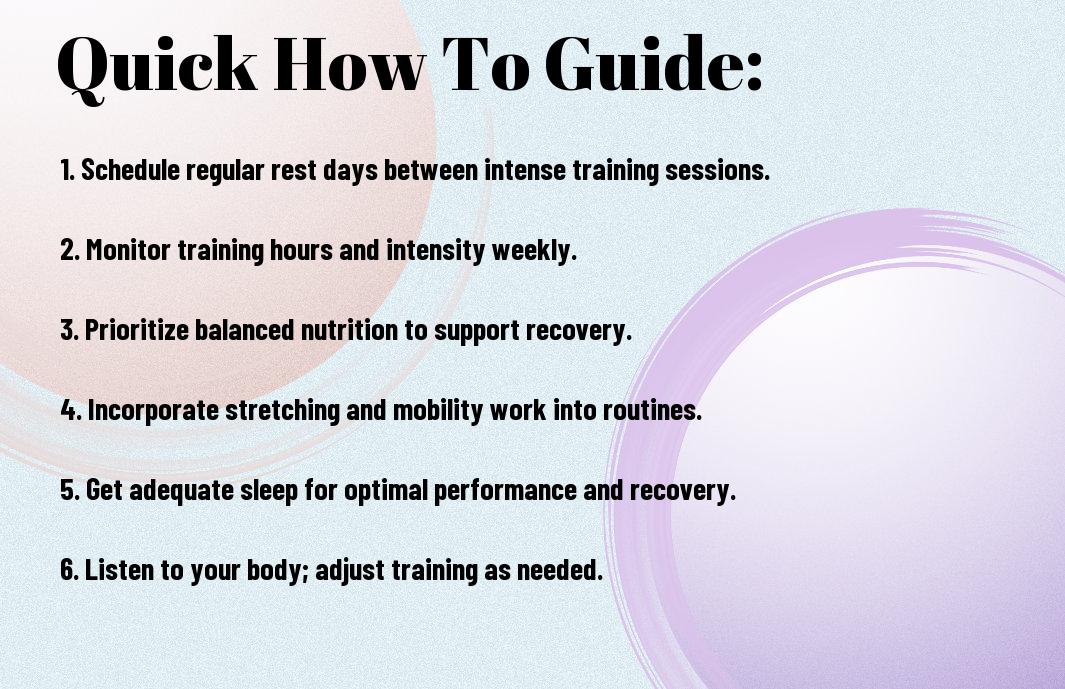Many athletes experience the fine line between pushing their limits and overtraining, which can lead to burnout and injuries. Understanding how to balance intensity, recovery, and overall wellness is important for your long-term success in sports. In this guide, you will learn effective strategies to recognize the signs of overtraining, implement adequate rest periods, and optimize your training regimen to maintain peak performance without compromising your health. By following these tips, you can ensure that your dedication to your sport translates into sustainable growth and achievement.
Key Takeaways:
- Listen to Your Body: Pay attention to signs of fatigue, pain, or irritability, which may indicate that you are overtraining.
- Incorporate Recovery: Schedule regular rest days and include activities like stretching or yoga to promote muscle recovery.
- Maintain Proper Nutrition: Fuel your body with a balanced diet that supports your energy needs and aids in recovery after intense workouts.
- Vary Your Training: Mix up your workout routine to prevent repetitive strain on specific muscle groups and to keep your training fresh.
- Keep a Training Log: Track your workouts, including duration, intensity, and how you feel, to identify patterns that may lead to overtraining.
Understanding Overtraining
While participating in sports, it’s vital to recognize the signs of overtraining to maintain peak performance. You might be at risk of overtraining if you escalate your training intensity without adequate recovery. For valuable insights, check out 5 Simple Tips to Avoid Overtraining – Track and Field Coach.
Definition of Overtraining
Now, overtraining occurs when your workout intensity and volume surpass your body’s ability to recover, leading to a detrimental imbalance. This condition can hinder your performance and may result in long-term health issues if not addressed promptly.
Symptoms and Signs of Overtraining
Even subtle changes can indicate overtraining, and being aware of these symptoms can help you adjust your training regimen. Common signs include persistent fatigue, decreased performance, and an increased resting heart rate.
Overtraining manifests in various ways, including chronic muscle soreness, irritability, sleep disturbances, and frequent illnesses. Pay close attention to your body’s signals, such as lack of motivation or a notable decline in your performance, as these symptoms suggest that you may need to adjust your training approach to optimize recovery and overall well-being.

Factors Contributing to Overtraining
Any athlete can fall victim to overtraining if they overlook certain factors. Here are some common contributors:
- High training intensity and volume
- Inadequate rest and recovery
- Lack of proper nutrition
- Psychological stress and burnout
- Inadequate variation in training
Recognizing these factors can help you tailor your training regimen effectively.
Training Intensity and Volume
Even if you are eager to achieve your goals, regularly pushing your limits with high intensity and excessive volume can lead to overtraining. It’s crucial to balance your efforts to enhance performance without overexerting yourself.
Insufficient Recovery and Rest
Some athletes underestimate the importance of rest, believing that more training always leads to better performance. However, without adequate recovery, your body cannot repair itself, increasing the risk of injury and fatigue.
Contributing factors such as poor sleep, inadequate nutrition, and a busy lifestyle can impede your ability to rest effectively. Prioritizing downtime is vital as it allows your body to recover and regenerate. Make sure to incorporate rest days into your training schedule and focus on quality sleep to boost your performance and overall wellbeing.
How to Prevent Overtraining
Unlike many athletes believe, preventing overtraining requires a proactive approach. Incorporate rest days into your schedule and vary your training intensity. Make sure to listen to your body and adjust your regimen as needed. Hydration, nutrition, and sleep play key roles in recovery. Lastly, don’t hesitate to seek advice from coaches or sports professionals when needed.
Establishing a Balanced Training Regimen
Some athletes often focus solely on building strength or endurance, neglecting other areas. You should aim for a balanced regimen that includes a mix of cardiovascular exercises, strength training, and flexibility work. This diversity not only enhances your overall athletic performance but also reduces the risk of burnout and injury by engaging different muscle groups.
Monitoring Physical and Mental Health
Clearly, keeping track of both your physical and mental well-being is necessary to prevent overtraining. You need to regularly assess your fatigue levels, mood, and motivation, as these factors can significantly influence your performance and recovery. Journaling your training sessions can be beneficial in identifying patterns and zones of overexertion.
This self-monitoring allows you to recognize early signs of overtraining, enabling you to adjust your training strategy accordingly. For example, if you notice recurring fatigue or a decrease in your performance levels, it might be time to modify your workout schedule or take an extra rest day. Ensuring that you prioritize mental health, through practices like mindfulness, can also help maintain focus and stay psychologically engaged in your sports journey.

Tips for Effective Recovery
Many athletes overlook the importance of recovery, which is imperative for optimizing performance. Incorporate these practices to enhance your recovery process:
- Prioritize rest days in your training schedule.
- Engage in active recovery activities like light walking or swimming.
- Utilize stretching and foam rolling to release muscle tension.
- Incorporate contrast baths or ice baths to reduce inflammation.
Perceiving recovery as a key component of your training regimen will help you avoid overtraining.
Nutrition and Hydration Strategies
Effective nutrition and hydration play pivotal roles in your recovery. Focus on consuming a balanced diet rich in proteins, carbohydrates, and healthy fats to replenish energy stores. Incorporate fruits and vegetables for imperative vitamins and minerals. Additionally, ensure you stay well-hydrated, as it aids in muscle function and recovery. Checking your hydration levels through urine color can help determine if you need more fluids post-training.
Importance of Sleep and Relaxation Techniques
One vital aspect of recovery is getting adequate sleep and utilizing relaxation techniques. Quality sleep helps in muscle repair and overall recovery, while practices like meditation or yoga can reduce stress levels and promote relaxation.
Nutrition affects not just your performance but also your sleep quality. Consuming a balanced diet can influence your body’s ability to relax and fall into a restful state. Key nutrients, such as magnesium and tryptophan, help aid sleep, so consider integrating foods like almonds and turkey into your meals. Prioritizing a nighttime routine and avoiding caffeine close to bedtime will significantly improve your sleep, allowing your body to recharge effectively.
Adjusting Your Training Plans
All athletes need to adapt their training plans regularly to prevent overtraining. This involves evaluating your current physical condition, recovery rate, and performance outcomes. By listening to your body and modifying your training intensity, frequency, and duration, you can ensure that you’re making steady progress without risking burnout or injury. Regularly revisiting and adjusting your training goals will keep you motivated and focused on long-term success.
Incorporating Cross-Training
Adjusting your routine by incorporating cross-training can help you maintain fitness while reducing the risk of overtraining. Engaging in different activities can offer varied physical challenges, allowing your muscles to recover while still keeping you active. This approach not only enhances your overall performance but also helps to prevent repetitive strain injuries by diversifying your movement patterns.
Setting Realistic Goals and Expectations
Plans tailored to your individual capabilities and limitations are fundamental to avoiding overtraining. By setting achievable goals, you allow yourself the necessary time to progress and adapt without excessive strain. Recognize that improvement is a gradual process, and focus on celebrating small victories along the way. Doing so will help you maintain motivation while ensuring your training remains sustainable and enjoyable.
A key aspect of setting realistic goals is understanding your current fitness level and personal circumstances. Take time to assess what you can feasibly achieve within your training timeline, considering factors like energy levels, recovery time, and life demands. By developing a balanced approach and adjusting your expectations, you create an environment that fosters progression without the burnout often associated with pushing beyond your limits.
Utilizing Professional Guidance
Now, enlisting the help of professionals can play a vital role in preventing overtraining. Coaches and trainers can provide tailored programs that align with your goals while ensuring that your body receives adequate recovery time. Their expertise helps you strike a balance between challenging workouts and necessary rest, which is crucial for sustainable progress.
Working with Coaches and Trainers
With the right coach or trainer, you can develop a structured training plan that emphasizes progression and recovery. They can help you identify signs of fatigue and adjust your workouts accordingly, ensuring that you stay motivated while minimizing the risk of overtraining. Their support can significantly enhance your athletic performance and overall well-being.
Seeking Support from Sports Medicine Professionals
Sports medicine professionals offer specialized insights into injury prevention and recovery strategies. Their knowledge can guide you in understanding how your body responds to training, helping to create a sustainable approach that prioritizes your health.
A sports medicine professional can conduct assessments to identify potential weaknesses or imbalances, providing you with targeted advice. They may recommend strengthening exercises or specific recovery techniques, thus helping to ensure you remain in peak condition. Engaging with these experts not only aids in preventing overtraining but also enhances your overall athletic performance, paving the way for long-term success in your sport.
Summing up
Upon reflecting on how to avoid overtraining in sports, it is imperative for you to prioritize adequate rest and recovery while listening to your body’s signals. Incorporate a balanced training regimen that includes varied intensities and sufficient downtime, ensuring you maintain overall well-being. Nutritional support, hydration, and mental health also play significant roles in your performance and recovery. By being proactive in managing these aspects, you can enhance your athletic journey while minimizing the risk of overtraining syndrome.
Q: What are the signs of overtraining that athletes should look out for?
A: Athletes should be aware of several signs that may indicate overtraining. These can include persistent fatigue, reduced performance despite adequate training, lack of motivation to train, disrupted sleep patterns, and increased occurrences of injuries or illness. Other symptoms may encompass mood swings, irritability, and elevated resting heart rates. Monitoring these indicators can help athletes take proactive measures to prevent overtraining.
Q: How can athletes effectively incorporate rest and recovery into their training schedules?
A: Incorporating rest and recovery into a training schedule is vital for preventing overtraining. Athletes should aim to include at least one full rest day each week and consider active recovery days that involve low-intensity activities such as yoga, walking, or swimming. Additionally, scheduling longer recovery periods following intense training blocks or competitions can be beneficial. Utilizing techniques such as stretching, foam rolling, or massage therapy can also enhance recovery and overall performance.
Q: What role does nutrition play in preventing overtraining in sports?
A: Nutrition plays a significant role in helping athletes avoid overtraining. Consuming a balanced diet rich in carbohydrates, proteins, and healthy fats provides the necessary fuel for intense training sessions. Additionally, staying hydrated and replenishing electrolytes is vital for optimal performance and recovery. Athletes should focus on consuming nutrient-dense foods that support muscle recovery, reduce inflammation, and maintain energy levels. Adequate caloric intake aligned with training demands is equally important to avoid burnout and fatigue.

